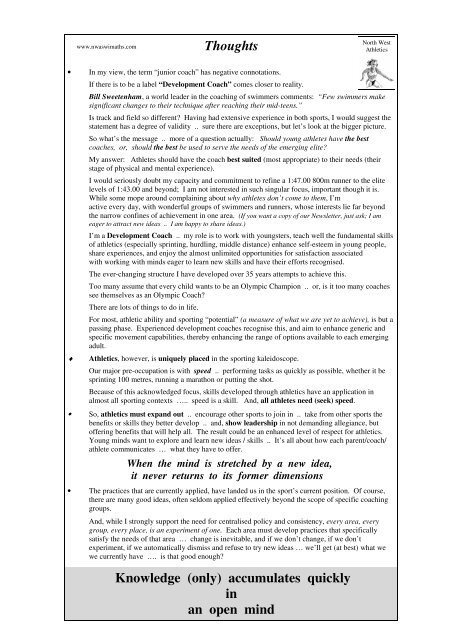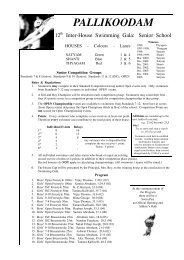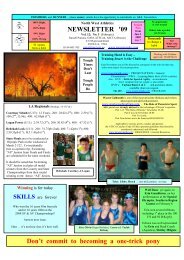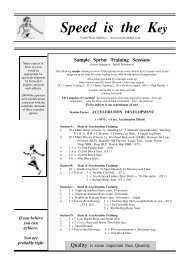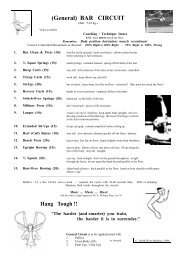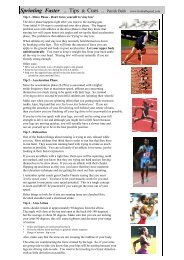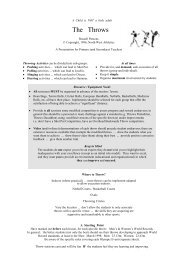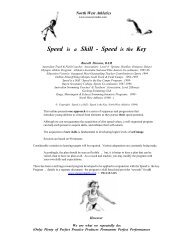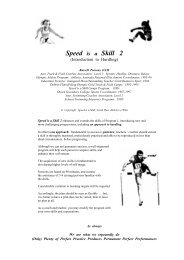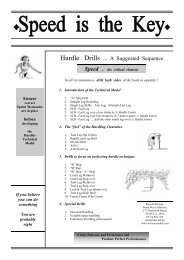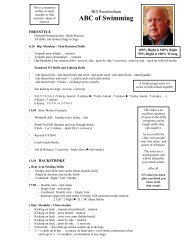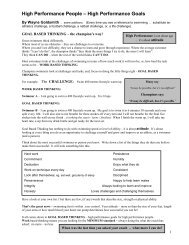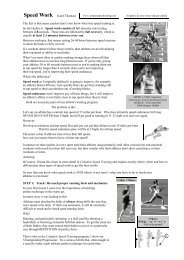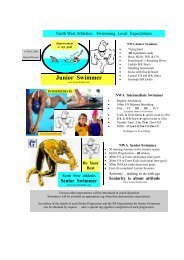Hurdles Sessions.pub - North West Athletics
Hurdles Sessions.pub - North West Athletics
Hurdles Sessions.pub - North West Athletics
You also want an ePaper? Increase the reach of your titles
YUMPU automatically turns print PDFs into web optimized ePapers that Google loves.
www.nwaswimaths.com<br />
Thoughts<br />
<strong>North</strong> <strong>West</strong><br />
<strong>Athletics</strong><br />
• In my view, the term “junior coach” has negative connotations.<br />
♦<br />
If there is to be a label “Development Coach” comes closer to reality.<br />
Bill Sweetenham, a world leader in the coaching of swimmers comments: “Few swimmers make<br />
significant changes to their technique after reaching their mid-teens.”<br />
Is track and field so different? Having had extensive experience in both sports, I would suggest the<br />
statement has a degree of validity .. sure there are exceptions, but let’s look at the bigger picture.<br />
So what’s the message .. more of a question actually: Should young athletes have the best<br />
coaches, or, should the best be used to serve the needs of the emerging elite?<br />
My answer: Athletes should have the coach best suited (most appropriate) to their needs (their<br />
stage of physical and mental experience).<br />
I would seriously doubt my capacity and commitment to refine a 1:47.00 800m runner to the elite<br />
levels of 1:43.00 and beyond; I am not interested in such singular focus, important though it is.<br />
While some mope around complaining about why athletes don’t come to them, I’m<br />
active every day, with wonderful groups of swimmers and runners, whose interests lie far beyond<br />
the narrow confines of achievement in one area. (If you want a copy of our Newsletter, just ask; I am<br />
eager to attract new ideas .. I am happy to share ideas.)<br />
I’m a Development Coach .. my role is to work with youngsters, teach well the fundamental skills<br />
of athletics (especially sprinting, hurdling, middle distance) enhance self-esteem in young people,<br />
share experiences, and enjoy the almost unlimited opportunities for satisfaction associated<br />
with working with minds eager to learn new skills and have their efforts recognised.<br />
The ever-changing structure I have developed over 35 years attempts to achieve this.<br />
Too many assume that every child wants to be an Olympic Champion .. or, is it too many coaches<br />
see themselves as an Olympic Coach?<br />
There are lots of things to do in life.<br />
For most, athletic ability and sporting “potential” (a measure of what we are yet to achieve), is but a<br />
passing phase. Experienced development coaches recognise this, and aim to enhance generic and<br />
specific movement capabilities, thereby enhancing the range of options available to each emerging<br />
adult.<br />
<strong>Athletics</strong>, however, is uniquely placed in the sporting kaleidoscope.<br />
Our major pre-occupation is with speed .. performing tasks as quickly as possible, whether it be<br />
sprinting 100 metres, running a marathon or putting the shot.<br />
Because of this acknowledged focus, skills developed through athletics have an application in<br />
almost all sporting contexts ….. speed is a skill. And, all athletes need (seek) speed.<br />
• So, athletics must expand out .. encourage other sports to join in .. take from other sports the<br />
benefits or skills they better develop .. and, show leadership in not demanding allegiance, but<br />
offering benefits that will help all. The result could be an enhanced level of respect for athletics.<br />
Young minds want to explore and learn new ideas / skills .. It’s all about how each parent/coach/<br />
athlete communicates … what they have to offer.<br />
When the mind is stretched by a new idea,<br />
it never returns to its former dimensions<br />
• The practices that are currently applied, have landed us in the sport’s current position. Of course,<br />
there are many good ideas, often seldom applied effectively beyond the scope of specific coaching<br />
groups.<br />
And, while I strongly support the need for centralised policy and consistency, every area, every<br />
group, every place, is an experiment of one. Each area must develop practices that specifically<br />
satisfy the needs of that area … change is inevitable, and if we don’t change, if we don’t<br />
experiment, if we automatically dismiss and refuse to try new ideas … we’ll get (at best) what we<br />
we currently have …. is that good enough?<br />
Knowledge (only) accumulates quickly<br />
in<br />
an open mind


